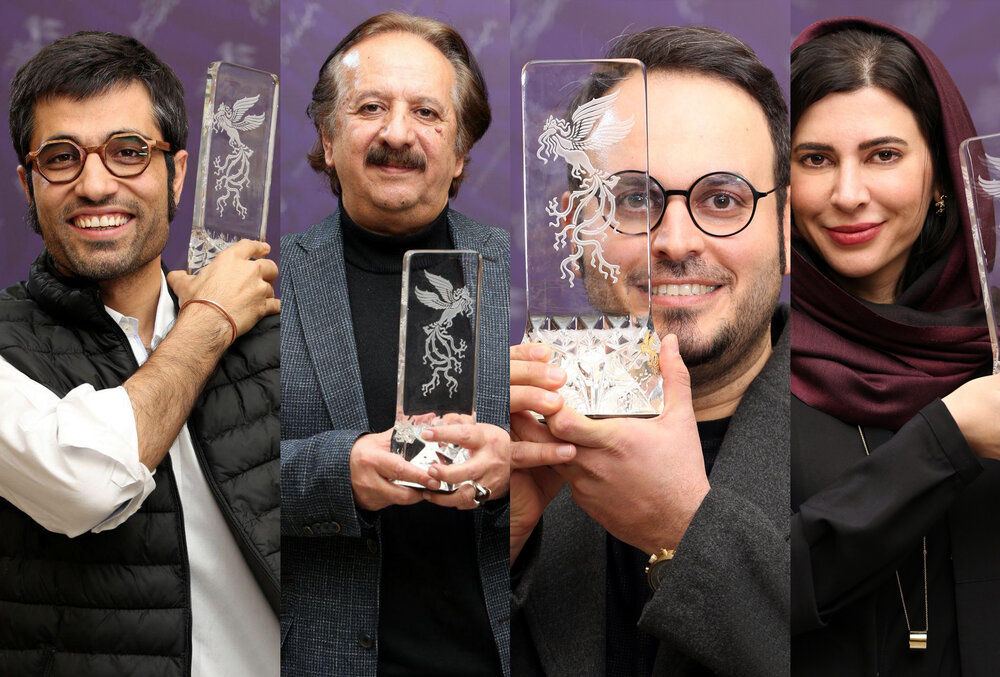Child labor drama “The Sun” shines as best film at Fajr festival

TEHRAN –(Iranart)- “The Sun”, Majid Majidi’s drama about child labor in Tehran, won the Crystal Simorgh for best film at the 38th edition of the Fajr Film Festival on Tuesday.
Majidi and his co-producer Amir Banan received their award during the closing ceremony of the festival organized at Tehran’s Milad Tower.
“I hope I can still work for my people and my country,” said Majidi who made his previous movie, “Beyond the Clouds”, in India.
“We become familiar with our people’s grief when we are working in the country, and I hope we can give our people a hopeful insight into life through the cinema,” he added.
Banan also expressed his happiness over the collaboration with Majid and noted, “This project was a jihadi one and all members of the crew worked with their total dedication for this project.”
The film, co-written by Majidi and Nima Javidi, won the award for best screenplay.
“I hope people and officials help solve the problem of child labor, and we would not see child workers anywhere in our cities,” Majid said after accepting his award and called on cinematographer Hooman Behmanesh to the stage for presenting his award to him.
He called Behmanesh Iran’s Vittorio Storaro, the renowned Italian cinematographer who collaborated with Majidi in his “Muhammad, the Messenger of God”.
A cast of Iran’s A-list film stars, including Ali Nasirian and Tannaz Tabatabai, and some students of a special school for child workers in the slums of Tehran played roles in the movie. The group of child workers received honorable mentions.
Mohammad-Hossein Mahdavian received the Crystal Simorgh for best director for his drama “Walnut Tree” based on the true story of the profound tragedy of Iraq’s chemical attack on the Iranian town of Sardasht in 1987.
Mahdavian said, “I thank producer Mostafa Ahmadi who agreed to finance this difficult project from the private sector.”
“This film is about the grief of the fathers of this land, and I dedicate my prize to all the bereaved fathers of our country, to all people who lost their lives over the past few months, from those people who died in November [unrests] to those people who died in the Ukrainian jetliner and the people who died in the Kerman stampede during the funeral of Commander Soleimani,” he stated.
Payman Maadi was crowned the best actor for his portrayal of Qader, the leading character of the drama. Maadi could not attend the ceremony due to his involvement in a film project outside Iran, therefore, Zhina Sadeqi, a child actor who played the role of Qader’s daughter, received the award in behalf of Maadi.
However, Maadi thanked Mahdavian for “this important film” in a video shown at the ceremony.
The special jury prize went to director/producer Saeid Malekan for his directorial debut “Day Zero” about Iran’s intelligence and police operations to arrest Jundallah terrorist group founder and leader Abdul-Malik Rigi.
The film also won Malekan the New Look award, which is presented to the best directorial debut feature film. The Golden Simorgh for best film from the national point of view also went to this movie.
No members of the cast and crew of the film were able to attend the ceremony. In an Instagram post, cast member Tino Salehi published a photo depicting empty seats reserved for the film’s crew and a note reading “We don’t take part.”
In addition, Ebrahim Darughezadeh, the director of the Fajr Film Festival, said that Malekan declined to attend the closing ceremony in protest of the jury’s decision to exclude from judgment those movies whose producers and directors have boycotted the festival.
The award for best actress went to Nazanin Ahmadi for her role in director Majid Barzegar’s drama “The Rain Falls Where It Will”.
Tannaz Tabatabai received the best supporting actress award for her cameo role in Mohammad Kart’s directorial debut “Butterfly Swimming”, which also brought Amir Aqai the best supporting actor honor.
The film produced by Rasul Sadr-Ameli, the director of the award-winning drama “The Girl in the Sneakers”, was crowned best audience film.
Earlier on January 3, the Fajr Film Festival announced that it would honor films on resistance and jihad this year with an award named after Lieutenant General Qassem Soleimani following the assassination of IRGC Quds Force commander in a U.S. air raid in Baghdad.
The award went to “Abadan 11, 60” directed by Mehrdad Khoshbakht. Produced by Hassan Kalani, the film presents the people’s fight against Iraqi forces in the southwestern Iranian city of Abadan during the early months of the Iran-Iraq war.
The following is a list of other winners at the festival.
Best editor: Esmaeil Alizadeh for “Butterfly Swimming.
Best director of cinematography: Morteza Najafi for “Tooman”.
Best composer: Bamdad Afshar for “Skin”.
Best sound engineer: Mohammad Saleh Kermani for “Butterfly Swimming.
Best sound effects engineer: Arash Qasemi for “Butterfly Swimming.
Best set design: Keyvan Moqaddam for “The Sun”.
Best costume designer: Amir Malekpur for “Day Zero”.
Best makeup artist: Mehrdad Mirkiani for “Exodus”.
Best practical special effects supervisor: Mohsen Ruzbehan for “Day Zero”.
Best computerized special effects supervisor: Mohammad Baradaran for “Exodus.
Best documentary: “No Place for Angels” directed by Sam Kalantari.
Best short film: “Dabur” by Saeid Nejati.
Best art and experience film: “Skin” co-directed by Bahman and Bahram Ark.
source: Tehran Times

